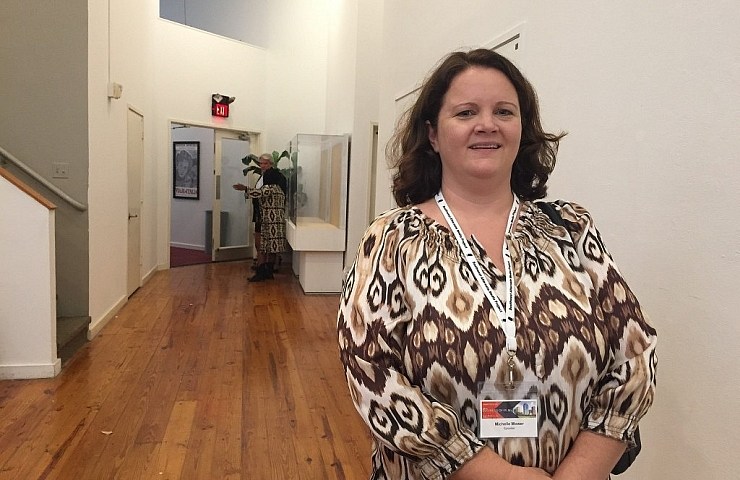UH alumna Michelle Mower visited the Rice University Media Center Sept. 18-19 to coordinate the 2015 Business of Film Conference.
A director and producer, she’s a champion of promoting Houston indie makers. Mower is a board member of SWAMP (Southwest Alternative Media Project), a non-profit organization designed to further the media arts in Houston, which sponsored the Conference. Drawing from her past, Mower bestowed pointers to young hopefuls, particularly to visiting UH students.
She’s helping them become the future of the film industry, and here is what she had to tell Cooglife about it.
Cooglife: Where did your aspirations with film originate?
Michelle Mower: As long as I can remember, I loved telling stories. When I was little, I would come up with all kinds of crazy scenarios and stories. I would write little plays and do puppet plays for my parents. I think that storytelling instinct was something I was born with. But bringing it around to screenwriting and directing was a sort of evolution that took place. I went from writing plays then I went a middle school event where I met a screenwriter and it occurred to me that movies were written. I’ve movies my entire life, but it didn’t occur to me (until now) that movies were written. From that point on, I said, I want to write movies. So I studied at the library and checked out every books on screenwriting, because we didn’t have the Internet back then. I got a little word processor typewriter. Once I got into college, I studied radio, television, film at the University of Houston. Had some wonderful professors who mentored me along and identified I did have a talent for writing. They encouraged me to direct because at that time, writers have little power in the industry. More often than not, their (original material), rarely get (in the final product). A lot of times, it gets changed and adapted and other writers come in and they change things. So in order to tell the stories I wanted to tell, it became a necessity for me to learn how to direct.
Cooglife: What would you say is your signature story?
Mower: A lot of my scripts deal with young women who are trying to find their own identity within a world where their identity has been defined by others. For instance, in my first film “The Preacher’s Daughter,” she doesn’t have her own identity other than she’s the preacher’s daughter. There’s a lot of assumption people made of her, not because of what she’s done herself, because of who her father is. Her journey is trying to find her own voice, her own belief system, her own identity, other than being the preacher’s daughter. There’s a lot of universal themes—feeling like you’re not meeting your parental expectations, general coming-of-age discovering your sexuality… in the backdrop of a hyper-religious world she lives in. My second film, “The Preacher’s Mistress,” is about a single mom who’s made some horrible choices in her life. Her mom is that constant voice of trying to make her healthy choices for herself. (But) even when she makes horrible choices, her mom is there and loves her regardless. My first film was (a) father-daughter (relationship). My second is mother-daughter relationship. In my next film, it is a husband and wife story.
Cooglife: What visions do you have for future works?
Mower: I’m a huge history buff. I love telling stories especially about women who have made an impact on history but just never been given the recognition. One of my heroes is a World War II spy Violette Szabo. If anyone would just hand me a 5 million dollar check and say, “here, go make a movie,” it would be about Szabo, who was very instrumental in helping us win WWII as with many women. And her story hasn’t been told. As a woman, I want to go back and retell those stories and make sure these women are recognized for the contributions they made throughout history.
Cooglife: What pointers do you have to give for aspiring filmmakers?
Mower: Don’t ask anyone for permission. Get out there and make your movie. Write a script. Get others to read it. Get a script analyst. Once you feel like the script is ready then just make it. Don’t wait for anyone to give you permission. If you don’t have the money, find people willing to collaborate with you. Ultimately this whole industry is built on relationship and collaboration. No man’s an island in this industry. Get out there, meet people, network, collaborate, work on their films. Together you will build your community and film industry together.





Recent Comments